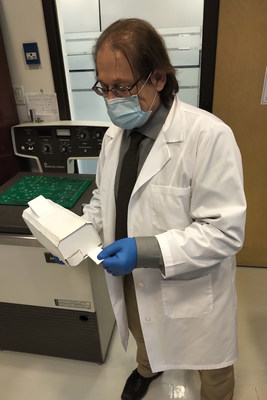Aerovirus Technologies Inc. (AvT) of St-Hyacinthe is developing the first real-time virus detection device, Aerovirus-1, to fight COVID-19.
Canada NewsWire
ST-HYACINTHE, QC, Nov. 26, 2020
ST-HYACINTHE, QC, Nov. 26, 2020 /CNW Telbec/ – It took nearly 10 years of research to create this new real-time detection device, called
Aerovirus-1, which is based on the use of synthetic antibodies (aptamers) for the prevention of respiratory diseases caused by airborne pathogens; those viruses and bacteria that are found in the air and are the source of various types of contamination in animal populations, at first glance, and which, to varying degrees, have harmful impacts on human health. This phenomenon of “transfection” from animals to humans is recognized as being at the root of the epidemics observed in humans.
This was revealed today by the Vice-President and Chief Technology Officer of Aerovirus Technologies Inc. (AvT), Dr.Normand Marchand B.Ing, M.Sc.A, Sc.D., who said that Aerovirus-1 can detect viruses in expired microdroplets in infected subjects as well as in asymptomatic carriers within approximately 6 minutes. The rapidity of action of this device is associated with the use of synthetic antibodies, capable of binding with a very high affinity to viruses responsible for respiratory infections.
These synthetic antibodies, ssDNA aptamers, are manufactured on a molecule-by-molecule basis to bind to viral proteins that control attachment to host pneumocytes. In fact, the use of synthetic antibodies is a substitute for antibodies that the mother nature is not able to produce quickly, or in sufficient quantities. When synthetic antibodies attach to viruses, this generates an electrical signal that is recorded by Aerovirus-1.
When compared to all existing devices and tests with margins of error of up to 33%, Aerovirus-1 has only a narrow margin of error of 2%.In addition, once the procedure is completed, the device can deliver a test result in just a few minutes, without the need for swabs taken by highly trained personnel.
Simple and easy to operate, Aerovirus-1, which is manually operated similar to a law enforcement radar device, is on track to be ready for production and commercialization in a very near future.
The device has the virtue of being able to meet the needs of prevention as well as proactive detection of viruses in terms of animal health, particularly on hog and poultry farms in the agri-food industry, as well as human health. “This unprecedented technological breakthrough is, to all intents and purposes, a key to the success of the fight against COVID-19 and all the viruses that affect all major sectors of our modern societies,” added Mr. Marchand.TheAerovirus-1project of Aerovirus Technologies Inc. (AvT) was recently recognized by the Ministère de l’Économie et de l’Innovation du Québec.For Aerovirus Technologies (AvT), early detection remains the cornerstone of a solid approach to preventing the spread of diseases that can ensure the full safety of environments at risk for humans, including public places, such as airports, hospitals, schools, institutional environments and businesses of all kinds.
Moreover, Mr. Marchand concluded, the Aerovirus-1, through its design, electronic and mechanical infrastructure, perfectly illustrates the great creative capacity and sense of innovation of Quebec researchers.Source: Dr.Normand Marchand, B.Ing, M.Sc.A, Sc.D.,Vice-President and Chief Technology Officer (AvT)
SOURCE Aerovirus Technologies Inc. (AvT)
![]() View original content to download multimedia:http://www.newswire.ca/en/releases/archive/November2020/26/c9905.html
View original content to download multimedia:http://www.newswire.ca/en/releases/archive/November2020/26/c9905.html





